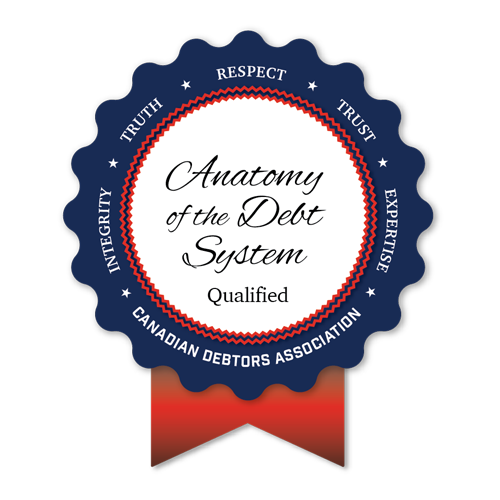 Decipher misconceptions and demystify the debt system’s parts and processes by learning how the debt industry works, particularly when Debtors experience challenges with meeting their debt obligations.
Decipher misconceptions and demystify the debt system’s parts and processes by learning how the debt industry works, particularly when Debtors experience challenges with meeting their debt obligations.
It’s imperative for a Debtor Advocate to understand how the debt industry fundamentally operates and how it typically treats Debtors, in order to successfully advocate for Debtors and their rights.
Like giant puzzle pieces, there are many diverse elements within the debt industry that somehow click together for a seemingly cohesive fit. When these diverse aspects are understood, a more formulated comprehension of the industry becomes possible.
The Anatomy of the Debt System Module’s training will provide participants with an understanding of various important aspects of the consumer debt system, with topics such as credit risk assessment, collections, the Canadian credit reporting system, the bankruptcy and insolvency system for consumer Debtors, and the legal processes that involve the recovery of debt.
This Module includes several components and training material such as Required Readings, Supplementary Readings, Workshop training, assignments, and a process to evaluate participant learnings.
Three Workshop training sessions focus on providing education about how the credit industry creates and deploys credit risk methodologies, tools, and practices across the consumer credit life cycle and how to advocate for Debtors in the Small Claims Court system. The acumen gained from these sessions intends to broaden the insights and perspectives of Debtor Advocates.
From the Anatomy of the Debt System Module, you will learn about essential aspects of the debt industry that will enable you to emerge with a stronger appreciation of how to navigate through its complexities. With a greater level of knowledge and enhanced confidence, your effectiveness in helping those that you serve, will reach new heights.
Workshop Information:
Workshop Session 1
Debtor Advocacy in the Small claims court
In this workshop, participants will learn how Debtors can avoid being sued in Small Claims Court, and how to navigate the system once they have been sued. Also, ways to use the court system to the Debtor’s advantage will be considered.
In addition, this Workshop session will explore how different jurisdictions enforce judgments against Debtors and how to protect Debtors from seizure of wages, bank accounts, and other assets.
Furthermore, participants will learn how to develop negotiation tactics when dealing with creditors once the debt has progressed to legal collections, or once judgment has been ordered.
Workshop Session 2
Debtor Advocates & Intermediaries
Workshop Session 3
How the Debt System Works in Canada & Debtor Rights
Workshop Trainer:
Michelle L. Haigh
Michelle Haigh is a licensed paralegal and founder and president of Precision Paralegal Services Professional Corporation. She has 20 years’ experience in the Small Claims Court.
Michelle graduated with Honours from the Paralegal Studies program at Sheridan College in 1996. She also holds Faculty of Law Certificate(s) in ADR/Advanced ADR from the University of Windsor.
Michelle was first appointed to the Paralegal Standing Committee at the Law Society of Upper Canada (now known as the Law Society of Ontario) in 2006 by the Attorney General of Ontario. Since then, she has worked with the committee to establish the by-laws governing the paralegal profession and the licensing process. Michelle was Chair of the Standing Committee from 2015 to 2018.In her last year as a bencher, the Treasurer of the Law Society of Ontario appointed Michelle as the Ontario Council Member to the Federation of Law Societies of Canada, the first paralegal to hold this position on the board.
Michelle is a member of the Toronto Small Claims Court “Frequent User Committee”, and was formerly a member of the Humber College Program Advisory Board, and the Sheridan College Advisory Board. Michelle has also sat on the boards for Legal Aid Ontario and the Canadian Mental Health Association (Halton Branch).

Workshop Dates and Time:
Three online sessions, once a week on Tuesdays, over a period of three consecutive weeks.
Dates and Times:
Workshop Session 1: Debtor Advocacy in the Small Claims Court
Tuesday, April 30th
Starting at 12:00 pm to 2:00 pm, Eastern Time Zone.
Workshop Session 2: Debtor Advocates & Intermediaries
Tuesday, May 7th
Starting at 12:00 pm to 2:00 pm, Eastern Time Zone.
Workshop Session 3: How the Debt System Works in Canada & Debtor Rights
Tuesday, May 14th
Starting at 12:00 pm to 2:00 pm, Eastern Time Zone.
Demonstrate your commitment to learn about the debt industry, add new knowledge to your role and convey this to debtors, consumers, regulators, your peers, and the industry through enrolling in this Module.
Upon successful completion, you will receive a Qualification Certificate in Anatomy of the Debt System.
Cost to Enroll in the Anatomy of the Debt System Module:
Regular Price $349 + tax
CDA Members $149 + tax

Highlights of Anatomy of the Debt System Module Learning:
The learning outcomes participants should expect from this Module include an understanding of these important aspects of the debt system such as:
- Consumer credit risk methodologies that lenders use to assess and manage credit risk, and the role that appetite for risk, credit policies, and specialized tools play, such as scorecards and risk models.
- The role of the Canadian credit reporting system for Debtors.
- How to navigate the Small Claims Court system and advocate for Debtors in that context.
- Debt collection and other legal processes that involve the recovery or discharge of debt through the Bankruptcy and Insolvency System for consumer Debtors.
By enrolling in the Anatomy of the Debt System Module, you are also on your path towards achieving your Certified Debtor Advocate professional designation. Attaining the Anatomy of the Debt System Certificate is one of the five mandatory elements of expertise required to earn the Certified Debtor Advocate credential that is bestowed to qualified individuals by the Canadian Debtors Association.
